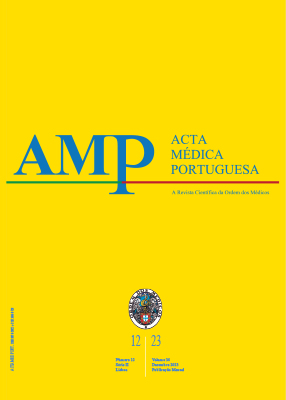Assessment of the Implementation of the International Health Regulations during the COVID-19 Pandemic: Portugal as a Case Study
DOI:
https://doi.org/10.20344/amp.19887Keywords:
COVID-19, Decision Making, Health Policy, International Health Regulations, Pandemics, PreparednessAbstract
Introduction: The International Health Regulations (IHR) were developed to prepare countries to deal with public health emergencies. The spread of SARS-CoV-2 underlined the need for international coordination, although few attempts were made to evaluate the integrated implementation of the IHR’s core capacities in response to the COVID-19 pandemic. The aim of this study was to evaluate whether IHR shortcomings stem from non-compliance or regulatory issues, using Portugal as a European case study due to its size, organization, and previous discrepancies between self-reporting and peer assessment of the IHR’s core capacities.
Methods: Fifteen public health medical residents involved in contact tracing in mainland Portugal interpreted the effectiveness of the IHR’s core capabilities by reviewing the publicly available evidence and reflecting on their own field experience, then grading each core capability according to the IHR Monitoring Framework. The assessment of IHR enforcement considered efforts made before and after the onset of the pandemic, covering the period up to July 2021.
Results: Four out of nine core IHR capacities (surveillance; response; risk communication; and human resource capacity) were classified as level 1, the lowest. Only two were graded level 3 (preparedness; and laboratory), the highest. The remaining three) (national legislation, policy & financing; coordination and national focal point communication; and points of entry) were classified as level 2.
Conclusion: Portugal exemplifies the extent to which implementation of the IHR was not fully achieved, which has resulted in the underperformance of several core capacities. There is a need to improve preparedness and international cooperation in order to harmonize and strengthen the global response to public health emergencies, with better political, institutional, and financial support.
Downloads
References
Kandel N, Chungong S, Omaar A, Xing J. Health security capacities in the context of COVID-19 outbreak: an analysis of International Health Regulations annual report data from 182 countries. Lancet. 2020;395:1047-53. DOI: https://doi.org/10.1016/S0140-6736(20)30553-5
World Health Organization. World Health Assembly 58. Revision of the international health regulations. Genebra: WHO; 2005.
World Health Organization. electronic state parties self-assessment annual reporting tool (e-SPAR). [cited 2021 Sep 04]. Available from: https://extranet.who.int/e-spar.
Ebola: what lessons for the International Health Regulations? Lancet. 2014;384:1321. DOI: https://doi.org/10.1016/S0140-6736(14)61697-4
de Rooij D, Belfroid E, Hadjichristodoulou C, Mouchtouri VA, Raab J, Timen A. Assessing training needs in infectious disease management at major ports, airports and ground-crossings in Europe. BMC Public Health. 2021;21:1013. DOI: https://doi.org/10.1186/s12889-021-11008-z
Adini B, Singer SR, Ringel R, Dickmann P. Earlier detection of public health risks – Health policy lessons for better compliance with the International Health Regulations (IHR 2005): Insights from low-, mid- and high-income countries. Health Policy. 2019;123:941-6. DOI: https://doi.org/10.1016/j.healthpol.2019.06.007
Wong MC, Huang J, Wong SH, Yuen-Chun Teoh J. The potential effectiveness of the WHO International Health Regulations capacity requirements on the control of the COVID-19 pandemic: a cross-sectional study of 114 countries. J R Soc Med. 2021;114:121-31. DOI: https://doi.org/10.1177/0141076821992453
Taylor AL, Habibi R, Burci GL, Dagron S, Eccleston-Turner M, Gostin LO, et al. Solidarity in the wake of COVID-19: reimagining the International Health Regulations. Lancet. 2020;396:82-3. DOI: https://doi.org/10.1016/S0140-6736(20)31417-3
Gostin LO, Habibi R, Meier BM. Has global health law risen to meet the COVID-19 challenge? Revisiting the international health regulations to prepare for future threats. J Law Med Ethics. 2020;48:376-81. DOI: https://doi.org/10.1177/1073110520935354
Barkia A, Laamrani H, Belalia A, Benmamoun A, Khader Y. Morocco’s national response to the COVID-19 pandemic: public health challenges and lessons learned. JMIR Public Health Surveill. 2021;7:e31930. DOI: https://doi.org/10.2196/31930
Sane J, Ruutu P, Soleman S, Elmi M. Implementation of the International Health Regulations in Somaliland supports multisectoral response to COVID-19. J Glob Health. 2020;10:020364. DOI: https://doi.org/10.7189/jogh.10.020364
Aavitsland P, Aguilera X, Al-Abri SS, Amani V, Aramburu CC, Attia TA, et al. Functioning of the International Health Regulations during the COVID-19 pandemic. Lancet. 2021;398:1283-7. DOI: https://doi.org/10.1016/S0140-6736(21)01911-5
The Independent Panel for Pandemic Preparedness & Response. COVID-19: make it the last pandemic. [cited 2021 Sep 04]. Available from: https://theindependentpanel.org/mainreport/.
Sá Machado R, Abreu Santos C, Martins M, Antunes D. International Health Regulations: core capacities assessment at points of entry in Portugal. Eur J Public Health. 2018;28:s402. DOI: https://doi.org/10.1093/eurpub/cky214.271
World Health Organization. IHR (2005) core capacity workbook: a series of exercises to assist the validation of core capacity implementation levels. 2015. [cited 2021 Sep 04]. Available from: https://www.who.int/publications/i/item/WHO-HSE-GCR-2015.13.
World Health Organization. Report of the review committee on the functioning of the International Health Regulations (2005) during the COVID-19 response (A74/9 Add.1). 2021. [cited 2021 Sep 04]. Available from: https://www.who.int/publications/m/item/a74-9-who-s-work-in-health-emergencies.
Downloads
Published
How to Cite
Issue
Section
License
Copyright (c) 2023 Acta Médica Portuguesa

This work is licensed under a Creative Commons Attribution-NonCommercial 4.0 International License.
All the articles published in the AMP are open access and comply with the requirements of funding agencies or academic institutions. The AMP is governed by the terms of the Creative Commons ‘Attribution – Non-Commercial Use - (CC-BY-NC)’ license, regarding the use by third parties.
It is the author’s responsibility to obtain approval for the reproduction of figures, tables, etc. from other publications.
Upon acceptance of an article for publication, the authors will be asked to complete the ICMJE “Copyright Liability and Copyright Sharing Statement “(http://www.actamedicaportuguesa.com/info/AMP-NormasPublicacao.pdf) and the “Declaration of Potential Conflicts of Interest” (http:// www.icmje.org/conflicts-of-interest). An e-mail will be sent to the corresponding author to acknowledge receipt of the manuscript.
After publication, the authors are authorised to make their articles available in repositories of their institutions of origin, as long as they always mention where they were published and according to the Creative Commons license.









